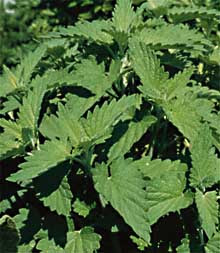Basil
I'm planting both Genovese and Sweet Basil.
Genovese basil is known for its flavor in making pesto.

Sweet basil is known for the spicy flavor of its leaves, which makes green salads, tomato and cheese dishes, soups, and omelettes extra yummy. It also has a very pleasing aroma.

Basil repels mosquitoes and flies, and it helps tomatoes fight off insects and disease and improves their growth and flavor. Because basil is much shorter than tomatoes, plant it parallel to the tomatoes rather than among them. If you're interested in growing Rue, keep it far apart from your basil. They don't like each other. Not one bit.
Bee Balm (Monarda)
I haven't ordered these yet, but several pages of my High Country Gardens catalog are marked on the pages with fabulous varieties of this plant, which helps improve the growth and flavor of tomatoes. (Lots of love for tomatoes so far!)
I may just make it easy on myself and order the Hummingbird Heaven Bee Balm sampler, which includes four gorgeous varieties of bee balm.

Catnip
 This herb is probably best known for its effect on cats, but some people also like to eat the leaves in salads, and freshly picked catnip can shoo away black ants.
This herb is probably best known for its effect on cats, but some people also like to eat the leaves in salads, and freshly picked catnip can shoo away black ants.Chamomile

Chamomile improves the growth and flavor of cabbages and onions, but it's potent stuff so you only need one plant every 150 feet. It also increases the essential oil of peppermint.
Chives

Chives like carrots and will improve their growth and flavor. If you happen to have an apple tree, chives can be planted nearby to help prevent apple scab. Made into a tea, it helps protect cucumbers from powdery mildew.
Coriander/cilantro

Cilantro will repel aphids. It helps anise to germinate but it doesn't like fennel much.
Dill

Dill likes cabbage but doesn't get along well with carrots. If you're a fan of honeybees, you'll be happy to know that they like dill blossoms.
Fennel

Poor fennel. It's pretty much universally disliked by vegetables and herbs, so it should be planted off in a corner by itself. In particular, it inhibits the growth of bush beans, caraway, kohlrabi and tomatoes.
Marjoram (Sweet)

Sweet marjoram (as well as the other varieties) can improve the growth and flavor of pretty much any nearby plant.
Mint

I plan to grow my mint in containers to help, um, contain it, but if you're so inclined to stick it in the ground, it will improve the health and flavor of cabbage and tomatoes.
Oregano

Oregano will repel the cabbage butterfly, and so is good to plant with broccoli.
Rosemary

Rosemary does well with broccoli and cabbage, and helps carrots by repelling the carrot fly.
Sage

A good multi-tasker, sage protects cabbage from the white cabbage butterfly and makes cabbage more tasty, and it protects carrots from carrot fly. Rosemary and sage have a mutual affection for each other. Cucumber, on the other hand, has no use for any aromatic herb, and it especially dislikes sage.
Thyme

Thyme plays well with others and can be planted pretty much anywhere in the garden.




Doing the plans to revive my herb garden so I really enjoyed your post, sounds like a great book, good luck with your garden!~Jacque
ReplyDeleteWowza you are going to have a whopping herb garden!! Watch that bee balm...In NY mine went rampant...everywhere!
ReplyDeleteGreat lesson in *friendship*.
....still feeling sorry for the fennel though.
try some lemon thyme. it's intoxicating!
ReplyDelete*aj*
Wow, your herb garden is inspiring...every year mine grows a little larger, but I have a long way to go!
ReplyDelete